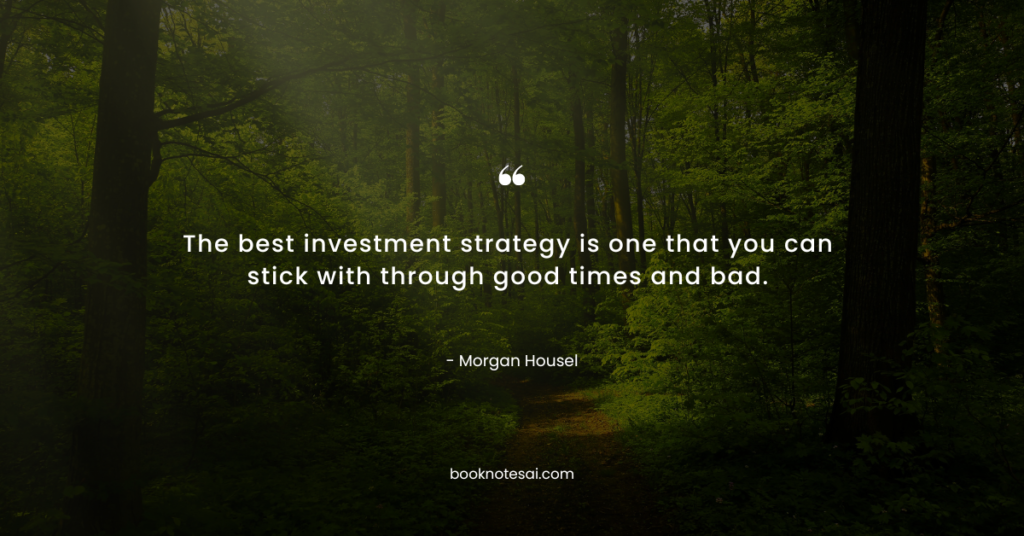Listen To This Post
The Psychology of Money Summary: Timeless Lessons on Wealth, Greed, and Happiness.

This is a book summary for The Psychology of Money by Morgan Housel. The key facts are organized to be easy to use, clear, and very valuable, all while helping you save loads of time.
Introduction: Why this book?
- Dive into the fascinating world of personal finance through Morgan Housel’s insightful exploration of the psychology behind money.
- Discover why Psychology of Money is a must-read, offering timeless wisdom that transcends financial literacy to illuminate the human experience of wealth and value.
The Psychology of Money Summary:
- In Psychology of Money, Morgan Housel delves into the nuanced relationship between psychology and finance, unraveling the mysteries of why we make certain financial decisions.
- Housel offers a compelling narrative on the psychological biases, behaviors, and patterns that influence our financial choices, backed by real-life anecdotes and research findings.
- Through engaging storytelling and practical insights, Psychology of Money prompts readers to reconsider their perceptions of wealth, risk, and success, fostering a deeper understanding of money’s true value in our lives.
- With clarity and wit, Housel guides readers on a journey of self-reflection and empowerment, inviting them to embrace a more mindful and purposeful approach to managing their finances.
- Ultimately, Psychology of Money is a timeless treasure trove of wisdom, offering profound lessons that extend far beyond the realm of personal finance, enriching our perspectives on life, happiness, and fulfillment.
💡 5 Big Ideas
- The Power of Compounding: Housel emphasizes the extraordinary impact of compounding, illustrating how small financial decisions made consistently over time can lead to significant wealth accumulation.
By understanding the exponential nature of compounding, we can cultivate patience and discipline in our financial journey, unlocking the full potential of long-term investing. - The Role of Behavior: Housel underscores the pivotal role of behavior in shaping our financial outcomes, highlighting the importance of emotional intelligence and self-awareness in making sound financial decisions.
Through mindfulness and introspection, we can navigate the complexities of money management with greater clarity and purpose, minimizing the influence of irrational impulses and biases. - The Myth of Wealth: Contrary to conventional wisdom, Housel challenges the notion that wealth is solely determined by financial metrics, arguing that true wealth encompasses a rich tapestry of experiences, relationships, and personal fulfillment.
By redefining our perception of wealth, we can cultivate a more holistic and meaningful approach to life and prosperity. - The Impact of Narrative: Housel explores the power of storytelling in shaping our financial beliefs and behaviors, revealing how narratives, both personal and societal, influence our financial decisions.
By critically examining the narratives we internalize about money, we can discern between truth and myth, empowering ourselves to make informed and intentional choices that align with our values and goals. - The Importance of Adaptability: In an ever-changing world, Housel emphasizes the value of adaptability and resilience in navigating financial uncertainty and volatility.
By embracing flexibility and learning from adversity, we can thrive in dynamic environments, seizing opportunities for growth and innovation amidst challenges.
In Psychology of Money, Morgan Housel distills these key insights into a captivating narrative, offering readers a profound understanding of the behavioral science behind personal finance and the timeless principles that govern our relationship with money.
Powerful Quotes
- “Investing is not the study of finance; it’s the study of how people behave with money.”
This quote emphasizes the psychological aspect of investing, highlighting the importance of understanding human behavior in financial decisions. - “The ability to adapt to changing environments is a hallmark of successful investors over the long term.”
This quote underscores the importance of adaptability and resilience in navigating financial markets. - “The single most powerful asset we have is our ability to think for ourselves.”
This quote encourages independent thinking and critical analysis in financial decision-making. - “Understanding that you can be wrong and that your beliefs can be flawed is crucial to being a successful investor.”
This quote underscores the importance of humility and intellectual honesty in the pursuit of financial success. - “The only way to deal with uncertainty is by embracing it.”
This quote highlights the inevitability of uncertainty in financial markets and encourages readers to embrace it as a natural part of investing. - “The greatest investment you can make is in yourself.”
This quote emphasizes the value of continuous learning and personal development in achieving financial prosperity. - “Risk is what happens when you make decisions without understanding what you’re doing.”
This quote underscores the importance of education and informed decision-making in managing financial risk. - “The goal of investing is not to minimize boredom; it’s to maximize returns.”
This quote challenges the notion of excitement in investing and emphasizes the importance of disciplined, long-term strategies. - “The best investment strategy is one that you can stick with through good times and bad.”
This quote highlights the importance of emotional resilience and steadfastness in achieving investment success. - “Money is a tool, not a goal.”
This quote reminds readers to prioritize their values and aspirations over mere accumulation of wealth, highlighting the intrinsic purpose of money in enriching lives.
One Reason To Read This Book:
Discover a profound understanding of the psychology behind personal finance and gain timeless insights to enrich your financial journey.
Who should I recommend The Psychology of Money Summary to?
“The Psychology of Money” is ideal for individuals of all ages and backgrounds seeking to deepen their understanding of personal finance and investment strategies.
Whether you’re a novice investor or a seasoned financial professional, this book offers invaluable wisdom to navigate the complexities of money management with clarity and confidence.
Recommendations:
- “Thinking, Fast and Slow” by Daniel Kahneman
- “The Behavior Gap: Simple Ways to Stop Doing Dumb Things with Money” by Carl Richards
- “Nudge: Improving Decisions About Health, Wealth, and Happiness” by Richard H. Thaler and Cass R. Sunstein
This summary serves as a complimentary guide to the reviewed title The Psychology of Money, offering key insights. For a deeper understanding, we encourage you to explore the full book.


